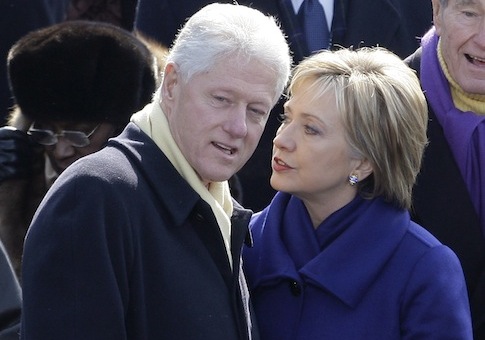- California Assembly OKs highest minimum wage in nation
- S. Korea unveils first graphic cigarette warnings
- US joins with South Korea, Japan in bid to deter North Korea
- LPGA golfer Chun In-gee finally back in action
- S. Korea won’t be top seed in final World Cup qualification round
- US men’s soccer misses 2nd straight Olympics
- US back on track in qualifying with 4-0 win over Guatemala
- High-intensity workout injuries spawn cottage industry
- CDC expands range of Zika mosquitoes into parts of Northeast
- Who knew? ‘The Walking Dead’ is helping families connect
Is Clinton marriage a rehash or relevant? Voters seem split

The long-running drama of Hillary Clinton’s marriage _ her husband’s infidelity and how she dealt with it _ is back as a subtext in this year’s presidential race.(File – AP)
WASHINGTON (AP) — It’s fair game. It’s ancient history.
It’s political. It’s personal.
Like it or not, the long-running drama of Hillary Clinton’s marriage — her husband’s infidelity and how she dealt with it — is back as a subtext in this year’s presidential race.
And plenty of Americans are right there with them on that: Bring up Bill’s behavior and Hillary’s coping techniques and they suddenly become monosyllabic and start glancing around for the exits.
But Hillary Clinton has plopped the question squarely in Americans’ laps not long before the Iowa caucuses on Monday open voting in the 2016 campaign.
“I’m going to let the American voters decide what’s relevant and what’s not relevant,” she said when asked about Trump’s accusations during a recent Democratic debate.
Interviews with dozens of potential voters around the country reveal strong and opposing views about how — and whether — Clinton should be measured by the way she dealt with her husband’s behavior.
“The personal stuff is irrelevant,” pronounces Brian Brown, a 56-year-old former professor and Democrat from Antrim, New Hampshire, who’s having coffee with a friend at Dunkin’ Donuts.
“I don’t like how she swept it under the rug, but then again, you don’t know what goes on behind the scenes,” says Jeff Daignault, a 46-year-old independent from Largo, Florida, who’s having lunch at a highway rest area.
“Hillary was an accomplice,” says Amy Stricker, a 57-year-old conservative from Rochester Hills, Michigan, who’s eating a sandwich in Denver, Colorado, on her way to visit family in the state.
Judith Hoffman, a 64-year-attorney from Columbus who plans to vote in Ohio’s Republican primary but isn’t sure whom she’ll support, pauses to consider whether Clinton’s handling of her husband’s behavior diminishes her standing as an advocate for women.
“I don’t know that anyone can be responsible for another person,” she says. But then she concludes that her gut reaction to the question is “yes,” it does mar Clinton’s reputation as a champion of women.
Clinton’s campaign rejects the notion that she was actively involved in aggressive efforts by her husband’s presidential campaign and the Clinton White House to discredit the president’s accusers.
“These are attempts to draw Hillary Clinton into decades-old allegations through fabrications that are unsubstantiated,” campaign spokesman Brian Fallon said Wednesday. “Hillary Clinton has spent her whole life standing up for women, and charges to the contrary are grossly unfair and untrue.”
Allegations of womanizing, extramarital affairs and abuse have trickled out over the course of Bill Clinton’s political life, including a wave of what his campaign referred to as “bimbo eruptions” when he first ran for president in 1992 and still more allegations of misbehavior after investigators in 1997 started looking into Clinton’s sexual encounters with White House intern Monica Lewinsky.
For much of that tumultuous time, Hillary Clinton’s stood by her husband publicly and cast his accusers as part of a “vast right-wing conspiracy.”
Writings about the Clinton White House years suggest she was more active behind the scenes, helping to drive political and legal strategy to defend her husband during the Lewinsky investigation, for example. Her friend Diane Blair wrote in her diary that the first lady had called Lewinsky a “narcissistic loony tune.”
It’s no small matter for Clinton, who draws a lopsided share of her support from female voters and for decades has made advocacy for women a big part of her persona.
Clinton herself has made the treatment of sexual assault victims a key issue this campaign.
“I want to send a message to every survivor of sexual assault,” Clinton said in one of her campaign ads last year. “Don’t let anyone silence your voice. You have a right to be heard and you have a right to believed.”
When a young woman asked Clinton in New Hampshire whether that message also applies to those who accused her husband of sexual impropriety, though, her answer was more convoluted.
“Everybody should be believed at first until they are disbelieved based on evidence,” she said.
It’s tricky territory for her, Republican presidential contender Rand Paul suggested when the matter was raised at the latest GOP debate. “I don’t blame Hillary Clinton at all for this,” he said, meaning Bill’s past. But “she can’t be a champion of women’s rights at the same time she’s got this that is always lurking out there, this type of behavior.”
Looking back now on the Clinton drama of the 1990s, Kay Sherman, a 70-year-old Republican from St. Petersburg, Florida, says she doesn’t want to judge the former first lady on how she handled a tough situation.
Still, she says, Clinton “could have stood up for women more.” Her actions, Sherman says, “kind of said to women, ‘It’s OK.’”
“It will probably come up in the campaign,” says Sherman. “I’d rather it not, though.”
___
Associated Press writers Tamara Lush in Terra Ceia, Florida; Ann Sanner in Columbus, Ohio; Holly Ramer in Concord, New Hampshire; Kristen Wyatt in Denver and Emily Swanson in Washington contributed to this report.















